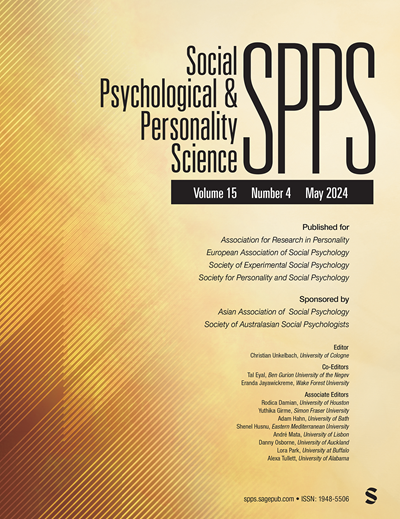High Openness and Low Conscientiousness Predict Green Party Preferences and Voting
IF 3.3
2区 心理学
Q1 PSYCHOLOGY, SOCIAL
引用次数: 0
Abstract
A substantial rise of vote shares of Green parties across European countries suggests an increasing support of environmental issues. A critical question for researchers and policymakers alike is, who endorses Green parties? Here, we examined the Big Five personality predictors of green partisanship, voting behavior, and party switching in a nationally representative sample of more than 27,000 Germans collected over a period of 16 years. Consistent with previous research, high openness and low conscientiousness emerged as the strongest personality predictors of green partisanship and voting behavior. Critically, high openness also predicted the likelihood to switch to a Green party vote across two federal elections. These effects held when controlling for demographics and environmental concerns, suggesting that the association between personality and support for Greens reflects more than social norms or attitudes about the environment. We close with a discussion of the theoretical and practical implications of these findings.高开放性和低自觉性可预测绿党偏好和投票情况
欧洲各国绿党得票率的大幅上升表明,人们越来越支持环境问题。研究人员和政策制定者面临的一个关键问题是:谁支持绿党?在此,我们对 16 年来收集的具有全国代表性的 27,000 多名德国人样本中的绿色党派、投票行为和政党转换的五大人格预测因素进行了研究。与之前的研究一致,高开放性和低自觉性是预测绿色党派倾向和投票行为最有力的人格因素。重要的是,高开放性还能预测在两次联邦选举中转向绿党投票的可能性。在控制了人口统计学和环境问题之后,这些效应依然存在,这表明人格与绿党支持率之间的关联所反映的不仅仅是社会规范或对环境的态度。最后,我们将讨论这些发现的理论和实践意义。
本文章由计算机程序翻译,如有差异,请以英文原文为准。
求助全文
约1分钟内获得全文
求助全文
来源期刊

Social Psychological and Personality Science
PSYCHOLOGY, SOCIAL-
CiteScore
12.50
自引率
1.80%
发文量
77
期刊介绍:
Social Psychological and Personality Science (SPPS) is a distinctive journal in the fields of social and personality psychology that focuses on publishing brief empirical study reports, typically limited to 5000 words. The journal's mission is to disseminate research that significantly contributes to the advancement of social psychological and personality science. It welcomes submissions that introduce new theories, present empirical data, propose innovative methods, or offer a combination of these elements. SPPS also places a high value on replication studies, giving them serious consideration regardless of whether they confirm or challenge the original findings, with a particular emphasis on replications of studies initially published in SPPS. The journal is committed to a rapid review and publication process, ensuring that research can swiftly enter the scientific discourse and become an integral part of ongoing academic conversations.
 求助内容:
求助内容: 应助结果提醒方式:
应助结果提醒方式:


